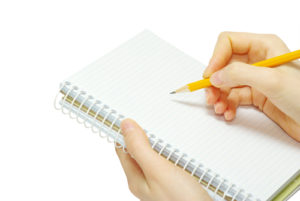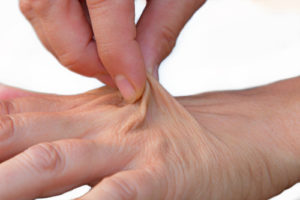If the body isn’t receiving enough fluids, (predominately water), then the end result could be dehydration. This will continue to occur as the body continues to lose fluids through sweat, urine and other factors. If expelled fluid isn’t replaced through food and drink, the body will try and compensate for what it lacks by producing a series of bodily effects. Below, we provide tips on just how to keep our elderly population safe and properly hydrated.
Tracking
 Keeping a written record of how much fluid your elder is drinking can be highly beneficial. This way, you are able to recognize their hydration levels. If it turns out that the individual is dehydrated, this method will also help you determine how much more fluid they should be consuming. It’s recommended that the average elderly adult drinks 7.1 cups of water a day.
Keeping a written record of how much fluid your elder is drinking can be highly beneficial. This way, you are able to recognize their hydration levels. If it turns out that the individual is dehydrated, this method will also help you determine how much more fluid they should be consuming. It’s recommended that the average elderly adult drinks 7.1 cups of water a day.
Warning Signs
Dehydration can lead to a slew of serious health problems. However, catching early warning signs can prevent an undesirable outcome. Indicators of  beginning dehydration include but are not limited to, fatigue, dizziness, and thirst. Don’t wait until your loved ones experience these symptoms to ensure proper fluid intake.
beginning dehydration include but are not limited to, fatigue, dizziness, and thirst. Don’t wait until your loved ones experience these symptoms to ensure proper fluid intake.
Diet
 Partaking of a diet high in water such as one that includes plenty of fruits and vegetables has also been shown to provide the body with the hydration it needs. Encouraging your loved one to enjoy these types of foods will be sure to ward off the potential for negative health issues.
Partaking of a diet high in water such as one that includes plenty of fruits and vegetables has also been shown to provide the body with the hydration it needs. Encouraging your loved one to enjoy these types of foods will be sure to ward off the potential for negative health issues.
Often, elder adults will lose interest in drinking altogether in fear of incontinence. When faced with this issue, offering them drinks earlier in the day and not as close to bedtime has been found to be helpful.
Conclusion
With these tips, we know that your senior is in great hands. Poor hydration habits are not to be taken lightly. If you’re unsure as to whether or not your loved one is properly nourished with necessary fluids, then these tips will be especially helpful. We encourage you not to wait until it’s too late. Early prevention techniques are key to the health and well-being of your loved one.